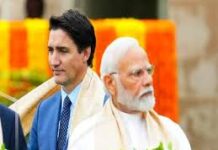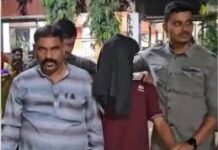The public transport authority in London today announced that it will remove all “Free Baloch” advertisements from the city’s buses as they breach its guidelines, days after it was launched to raise awareness against alleged human rights abuses in the restive province by the Pakistan government.
Transport for London (TfL) said the advertisements, part of an awareness drive by the World Baloch Organisation launched last week, had been accepted in error by a partner organisation.
“This advert does not comply with our advertising guidelines. It was accepted in error by our advertising partner and was not referred to us for our consideration. We have instructed that all such adverts must be removed immediately,” a TfL spokesperson said.
Activists campaigning for an independent Balochistan in the UK launched the bus phase of an advertising drive following similar adverts on London’s taxis and billboards to highlight alleged human rights abuses by the Pakistan government.
Pakistan had expressed concern over the appearance of “Free Balochistan” advertisements and on November 3 summoned the British High Commissioner in Islamabad to protest over the slogans displayed on London cabs.
Slogans such as “Free Balochistan”, “Save The Baloch People” and “Stop Enforced Disappearances” were removed from taxis recently and the organisation is working with TfL to modify the wordings to meet “Clause H” of its advertising guideline which forbids sensitive or controversial campaigns.
“By the time each of the adverts from 100 buses is removed, our message would have made a mark,” said Bhawal Mengal, spokesperson for the World Baloch Organisation who believes TfL’s reaction against the adverts is a result of pressure from the Pakistani government.
“This is a peaceful advertising campaign. Pakistan’s aggressive reaction is a bare-faced attempt to intimidate the UK government and Baloch human rights defenders,” he said.
The advertising campaign has been backed by British human rights campaigner Peter Tatchell who said Pakistan’s attempts to prevent them were anti-democratic.
“Pakistan is seeking to impose on the UK the same censorship about Balochistan that it imposes inside Pakistan. This is an outrageous bid to subvert our democratic tradition of allowing the free exchange of ideas,” said Mr Tatchell.
Baloch people argue that they are ethnically and culturally different from the rest of Pakistan and have been campaigning for an independent nation for years.
Pakistan dismisses any notion of a “free Balochistan” as an attack on its sovereignty.
“Balochistan was previously a British protectorate that was granted independence in 1947. It was forcefully annexed by Pakistan in 1948 and has been militarily occupied ever since.
The people of Balochistan have been denied the right to selfdetermination, contrary to the UN Charter,” said Noordin Mengal, a member of the World Baloch Organisation.
The organisation describes itself as a non-violent and democratic international membership organisation dedicated to defending the Baloch peoples’ political, social and cultural rights.
It said that it will continue to “peacefully” speak out against human rights violations in Balochistan.















